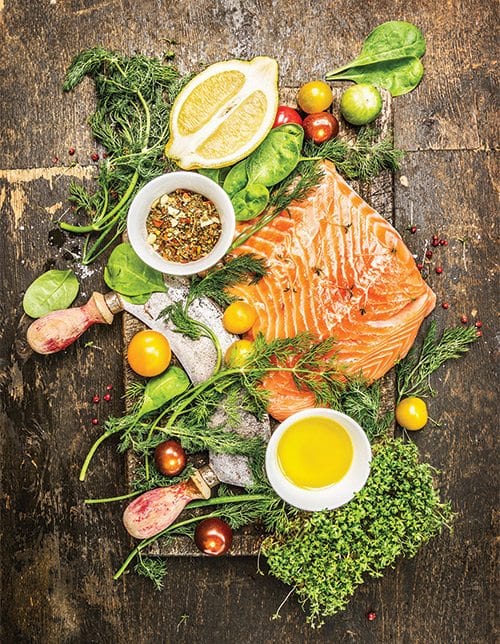A change in dietary guidelines
Foods high in cholesterol not the greatest threat

The 2015 Dietary Guidelines for Americans have finally made their entry. Updated every five years by the U.S. Departments of Health and Human Services and Agriculture, the guidelines provide recommendations to promote good health through healthy eating.
Healthy Hints
There is no exact menu to follow for healthy eating. Below are some general guidelines to help you choose wisely.
- Increase healthy fats. Some fats are actually healthy. Monounsaturated fats like olive oil and avocados can improve LDL cholesterol levels, according to Mayo Clinic, as well as omega-3 fats found in fish, such as salmon and albacore tuna. Walnuts, peanuts, almonds and other nuts and seeds help keep blood vessels healthy. Although nuts are good for you, they are high in calories and should be eaten in moderation. A handful a day will do.
- Switch the carbs. You need carbs for fuel, but carbs from whole-grain bread, brown rice, and other whole grains provide fuel as well as much needed nutrients. They are also high in fiber which helps prevent fat buildup in the blood.
- Eat your veggies. Plant-based foods like fruits and vegetables are antioxidants that squelch the damage from free radicals that are linked not only to cardiovascular diseases but also to cancer.
- Spice it up. People tend to overlook the health benefits of herbs and spices such as turmeric, ginger and garlic. These spices are powerful antioxidants and may lower cholesterol and prevent the buildup of plaque that is linked to heart disease.
Some guidelines have not changed. Americans are advised to eat more fruits and vegetables, whole grains and lean protein, for example. But two recommendations in particular are not only new, they are game-changing.
The 300 milligrams per day limit of dietary cholesterol has been lifted. Although this change has sparked discussion within the nutrition and public health community, the guidelines are quick to point out that “this change does not suggest that dietary cholesterol is no longer important to consider when building healthy eating patterns.”
Research now shows, however, that the cholesterol we eat has only a small effect on blood cholesterol levels for most people. A meta-analysis published in the American Journal of Clinical Nutrition found no association between saturated fat and heart disease in prospective studies involving close to 350,000 participants. Another study from Japan actually found an inverse association between saturated fat and stroke. In other words, those who ate more saturated fat had a lower risk of stroke.
Trans fats still taboo
Based on these and other findings the DGA revised its advice. Cholesterol-rich foods, like eggs, shrimp and lobster are no longer completely forbidden. One egg, which has 186 mg of cholesterol, will not affect your overall cholesterol if it is part of a healthy eating plan. That does not mean that these foods can be eaten with abandon. The guidelines advise that people consume less than 10 percent of their calories from saturated fat. In general, foods that are higher in dietary cholesterol, such as fatty meats, are also higher in saturated fat.
Trans fats, however, do not get a pass. Trans fats, also called partially hydrogenated fats, are created when hydrogen is added to liquid vegetable oil, thereby making it solid at room temperature. These types of fats that are found in fried foods, pastries and snacks, for example, have been found to increase the ratio of unhealthy cholesterol levels. There is no specified limit of trans fats — only that individuals should eat as little as possible.
Added sugars the culprit
A guilty finger is now being pointed at another culprit. Refined carbohydrates may be a greater problem and a greater contributor to heart disease than fats. The DGA recommend that people consume less than 10 percent of calories from refined carbohydrates, such as added sugars. Examples are table sugar, high fructose corn syrup and other sweeteners found in pastries, sugar-sweetened beverages and energy drinks. A study published in the Journal of the American Medical Association: Internal Medicine discovered that those who consumed 17 to 21 percent of calories from added sugar each day had a 38 percent increased risk of dying from cardiovascular disease compared to those who consumed only 8 percent of their calories from sugar.
When not used as energy large consumptions of refined carbohydrates can set in motion some less than desirable outcomes. It can convert the glucose or sugar into body fat, which causes weight gain, most likely around the waist. Or it can convert it into fat that is stored in the liver, causing a condition known as fatty liver, which in extreme cases can cause scarring and even liver failure.
Researchers at Harvard Medical School suggest that refined carbohydrates pose another danger. They may precipitate low-grade inflammation that sets the stage for atherosclerosis and cholesterol-clogged arteries, the forerunners of heart disease. Foods and drinks containing added sugars are a large contributor.
Although the change in guidelines can be confusing, they reflect advancements in scientific and medical knowledge, which is always evolving. As Michael F. Jacobson, the president of the Center for Science in the Public Interest so aptly stated, “The advice presented in the 2015 Dietary Guidelines for Americans is sound, sensible and science-based. If Americans ate according to that advice, it would be a huge win for the public’s health.”







